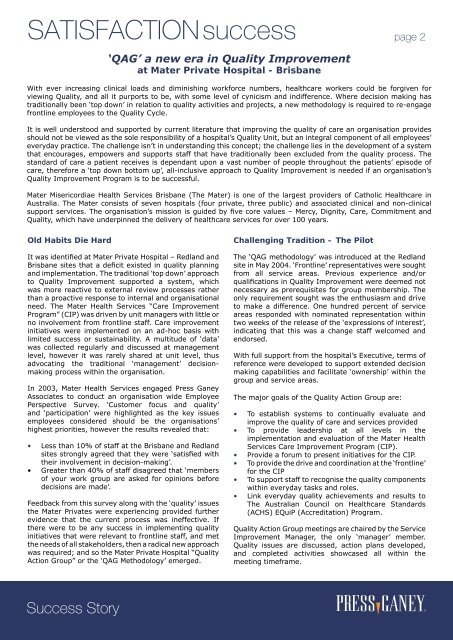Mater Private Hospital Brisbane, Queensland - Press Ganey Australia
Mater Private Hospital Brisbane, Queensland - Press Ganey Australia
Mater Private Hospital Brisbane, Queensland - Press Ganey Australia
You also want an ePaper? Increase the reach of your titles
YUMPU automatically turns print PDFs into web optimized ePapers that Google loves.
SATISFACTION success<br />
Old Habits Die Hard<br />
It was identified at <strong>Mater</strong> <strong>Private</strong> <strong>Hospital</strong> – Redland and<br />
<strong>Brisbane</strong> sites that a deficit existed in quality planning<br />
and implementation. The traditional ‘top down’ approach<br />
to Quality Improvement supported a system, which<br />
was more reactive to external review processes rather<br />
than a proactive response to internal and organisational<br />
need. The <strong>Mater</strong> Health Services “Care Improvement<br />
Program” (CIP) was driven by unit managers with little or<br />
no involvement from frontline staff. Care improvement<br />
initiatives were implemented on an ad-hoc basis with<br />
limited success or sustainability. A multitude of ‘data’<br />
was collected regularly and discussed at management<br />
level, however it was rarely shared at unit level, thus<br />
advocating the traditional ‘management’ decisionmaking<br />
process within the organisation.<br />
In 2003, <strong>Mater</strong> Health Services engaged <strong>Press</strong> <strong>Ganey</strong><br />
Associates to conduct an organisation wide Employee<br />
Perspective Survey. ‘Customer focus and quality’<br />
and ‘participation’ were highlighted as the key issues<br />
employees considered should be the organisations’<br />
highest priorities, however the results revealed that:<br />
•<br />
•<br />
‘QAG’ a new era in Quality Improvement<br />
at <strong>Mater</strong> <strong>Private</strong> <strong>Hospital</strong> - <strong>Brisbane</strong><br />
Less than 10% of staff at the <strong>Brisbane</strong> and Redland<br />
sites strongly agreed that they were ‘satisfied with<br />
their involvement in decision-making’.<br />
Greater than 40% of staff disagreed that ‘members<br />
of your work group are asked for opinions before<br />
decisions are made’.<br />
Feedback from this survey along with the ‘quality’ issues<br />
the <strong>Mater</strong> <strong>Private</strong>s were experiencing provided further<br />
evidence that the current process was ineffective. If<br />
there were to be any success in implementing quality<br />
initiatives that were relevant to frontline staff, and met<br />
the needs of all stakeholders, then a radical new approach<br />
was required; and so the <strong>Mater</strong> <strong>Private</strong> <strong>Hospital</strong> “Quality<br />
Action Group” or the ‘QAG Methodology’ emerged.<br />
Challenging Tradition – The Pilot<br />
The ‘QAG methodology’ was introduced at the Redland<br />
site in May 2004. ‘Frontline’ representatives were sought<br />
from all service areas. Previous experience and/or<br />
qualifications in Quality Improvement were deemed not<br />
necessary as prerequisites for group membership. The<br />
only requirement sought was the enthusiasm and drive<br />
to make a difference. One hundred percent of service<br />
areas responded with nominated representation within<br />
two weeks of the release of the ‘expressions of interest’,<br />
indicating that this was a change staff welcomed and<br />
endorsed.<br />
With full support from the hospital’s Executive, terms of<br />
reference were developed to support extended decision<br />
making capabilities and facilitate ‘ownership’ within the<br />
group and service areas.<br />
The major goals of the Quality Action Group are:<br />
•<br />
•<br />
•<br />
•<br />
•<br />
•<br />
page 2<br />
With ever increasing clinical loads and diminishing workforce numbers, healthcare workers could be forgiven for<br />
viewing Quality, and all it purports to be, with some level of cynicism and indifference. Where decision making has<br />
traditionally been ‘top down’ in relation to quality activities and projects, a new methodology is required to re-engage<br />
frontline employees to the Quality Cycle.<br />
It is well understood and supported by current literature that improving the quality of care an organisation provides<br />
should not be viewed as the sole responsibility of a hospital’s Quality Unit, but an integral component of all employees’<br />
everyday practice. The challenge isn’t in understanding this concept; the challenge lies in the development of a system<br />
that encourages, empowers and supports staff that have traditionally been excluded from the quality process. The<br />
standard of care a patient receives is dependant upon a vast number of people throughout the patients’ episode of<br />
care, therefore a ‘top down bottom up’, all-inclusive approach to Quality Improvement is needed if an organisation’s<br />
Quality Improvement Program is to be successful.<br />
<strong>Mater</strong> Misericordiae Health Services <strong>Brisbane</strong> (The <strong>Mater</strong>) is one of the largest providers of Catholic Healthcare in<br />
<strong>Australia</strong>. The <strong>Mater</strong> consists of seven hospitals (four private, three public) and associated clinical and non-clinical<br />
support services. The organisation’s mission is guided by five core values – Mercy, Dignity, Care, Commitment and<br />
Quality, which have underpinned the delivery of healthcare services for over 100 years.<br />
Success Story<br />
To establish systems to continually evaluate and<br />
improve the quality of care and services provided<br />
To provide leadership at all levels in the<br />
implementation and evaluation of the <strong>Mater</strong> Health<br />
Services Care Improvement Program (CIP).<br />
Provide a forum to present initiatives for the CIP.<br />
To provide the drive and coordination at the ‘frontline’<br />
for the CIP<br />
To support staff to recognise the quality components<br />
within everyday tasks and roles.<br />
Link everyday quality achievements and results to<br />
The <strong>Australia</strong>n Council on Healthcare Standards<br />
(ACHS) EQuiP (Accreditation) Program.<br />
Quality Action Group meetings are chaired by the Service<br />
Improvement Manager, the only ‘manager’ member.<br />
Quality issues are discussed, action plans developed,<br />
and completed activities showcased all within the<br />
meeting timeframe.


